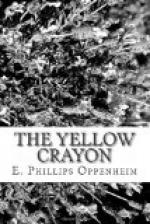She laughed.
“I knew that you would come,” she said, “and yet I knew that it would be a struggle between you and them. For—the Prince—” she murmured, lowering her voice, “had pledged his word to keep us apart.”
Mr. Sabin raised his head, and his eyes traveled towards the figure of the man who sat with his back to them in the far distant corner of the room.
“The Prince,” he said softly, “is faithful to his ancient enmities.”
Lucille’s face was troubled. She turned to her companion with a little grimace.
“He would have me believe,” she murmured, “that he is faithful to other things besides his enmities.”
Mr. Sabin smiled.
“I am not jealous,” he said softly, “of the Prince of Saxe Leinitzer!”
As though attracted by the mention of his name, which must, however, have been unheard by him, the Prince at that moment turned round and looked for a moment towards them. He shot a quick glance at Lady Carey. Almost at once she rose from her chair and came across to them.
“The Prince’s watch-dog,” Lucille murmured. “Hateful woman! She is bound hand and foot to him, and yet—”
Her eyes met his, and he laughed.
“Really,” he said, “you and I in our old age might be hero and heroine of a little romance—the undesiring objects of a hopeless affection!”
Lady Carey sank into a low chair by their side. “You two,” she said, with a slow, malicious smile, “are a pattern to this wicked world. Don’t you know that such fidelity is positively sinful, and after three years in such a country too?”
“It is the approach of senility,” Mr. Sabin answered her. “I am an old man, Lady Muriel!”
She shrugged her shoulders.
“You are like Ulysses,” she said. “The gods, or rather the goddesses, have helped you towards immortality.”
“It is,” Mr. Sabin answered, “the most delicious piece of flattery I have ever heard.”
“Calypso,” she murmured, nodding towards Lucille, “is by your side.”
“Really,” Mr. Sabin interrupted, “I must protest. Lucille and I were married by a most respectable Episcopalian clergyman. We have documentary evidence. Besides, if Lucille is Calypso, what about Penelope?”
Lady Carey smiled thoughtfully.
“I have always thought,” she said, “that Penelope was a myth. In your case I should say that Penelope represents a return to sanity —to the ordinary ways of life.”
Mr. Sabin and Lucille exchanged swift glances. He raised his eyebrows.
“Our little idyll,” he said, “seems to be the sport and buffet of every one. You forget that I am of the old world. I do not understand modernity.”
“Ulysses,” she answered, “was of the old world, yet he was a wanderer in more senses of the word than one. And there have been times—”
Her eyes sought his. He ignored absolutely the subtlety of meaning which lurked beneath the heavy drooping eyelids.




